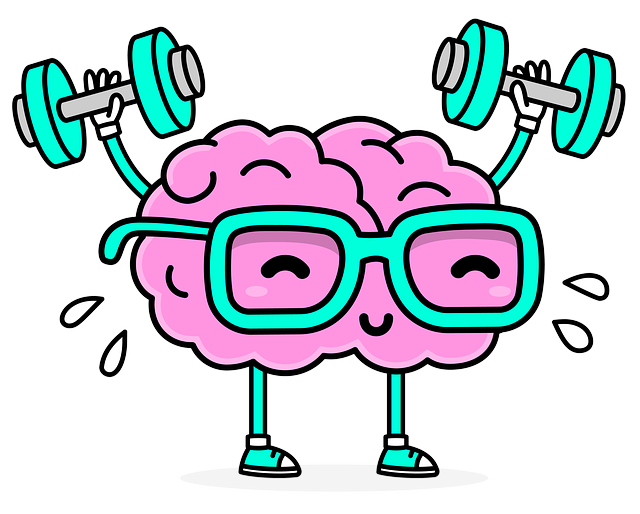
A Good Life is a Life of Struggle
This is because struggle makes you stronger, and strength is the source of physical and psychological freedom.
It’s obvious how struggling against heavy weights in the gym or struggling against a steep mountain while hiking makes you stronger – your muscles respond to such challenges by growing.
What’s less obvious is how this principle applies to your mind.
The brain is like a bunch of muscles, so you strengthen your mind through struggle—by doing hard things and by putting in your reps.

The mental gym is everywhere. Your job is to become aware of the many opportunities you have for mental training and capitalize on them.
- Whenever your mind is challenged, it’s a chance to become smarter.
- Every painful experience offers you an opportunity to develop emotional fortitude.
- Any time your willpower is called upon, it’s an exercise that increases your self-discipline.
If You View Struggle in this Way, it Becomes a Good Thing
For example, when you’re stuck in traffic, you can view it as an inconvenience and be upset, or you can view it as an opportunity to develop greater patience – an unplanned visit to the patience-trainer at the mental gym.
Of course, it’s a struggle to be patient – it’s easier to let yourself be upset – but that’s the whole point. Patience grows when it gets used. Skills develop when they have to. Who knows when you’ll need that additional patience for something more important than sitting in traffic?
Opportunities to Build Strength Through Struggle are Everywhere
Even the actual gym is also a mental gym because pushing yourself physically builds mental toughness. As James Clear has pointed out, choosing to do one more rep when you would prefer to stop doesn’t just make your body stronger, it makes your mind stronger too.1
My favorite deliberate mental workout is meditation. It’s such a simple thing to do – sitting still and paying attention to your breath – but it’s profoundly difficult. And that’s the whole point: The struggle to stay focused on your breathing is where all of the benefits come from. As Dan Harris explains, every time you return your focus to your breath, it’s like a bicep curl for your prefrontal cortex,2 strengthening your focus muscle.
Meditation, as with any task that requires focus, is much easier in a quiet environment. A distracting environment, then, would seem to hinder meditation. However, this assumes that the goal of meditation is to be focused, and this is wrong. The goal of meditation is to struggle to focus. Meditating in a noisy environment is like biking into a headwind. It’s more difficult, yes, but the struggle makes you stronger.
More Surprising Opportunities for Mental Training
- Temptation: When you are faced with temptation, you are being unwittingly transported to yet another mental gym. Choosing the right thing takes skill and strength. View the act of choosing as deliberate practice and embrace the struggle as an opportunity to give your willpower muscle a workout.
- Misfortune: When something upsetting happens, you are being given a chance to practice emotional stability. By struggling to draw your feelings from within rather than succumbing to what the environment is “making” you feel, you are developing a form of resilience that is essential to living a happy life.
- Difficult People: Difficult people are no fun, of course, but, by triggering negative emotions and pulling you away from your values, they provide opportunities for the struggle that cultivates inner strength. As Buddhist teacher Pema Chödrön says, “Difficult people are … the greatest teachers.”3
This doesn’t mean you are supposed to like being annoyed or wronged. That would be absurd. But you can make an effort to feel good in spite of whatever is upsetting you by deliberately thinking about the reasons you have to be grateful. With practice, you can learn to experience gratitude and joy in mundane or even painful situations.
Due to injuries, I’ve spent the past decade of my life in near-constant physical pain. By learning to be emotionally well while feeling physically unwell, I’ve greatly increased my resilience and my day-to-day happiness. I’ve come to see pain as the price of admission – a necessary cost I must pay to live. And by accepting my pain, I’m able to pursue goals far more meaningful than physical comfort.
Setbacks and obstacles of any sort can be viewed as mental training.
Challenges are not threats; they’re opportunities.
And struggle makes you stronger.
1 Clear, James. “The Science of Developing Mental Toughness in Your Health, Work, and Life.”
2 Harris, Dan. 10% Happier Revised Edition: How I Tamed the Voice in My Head, Reduced Stress Without Losing My Edge, and Found Self-Help That Actually Works–A True Story. It Books, 2014. Video book summary.
3 Chödrön, Pema. The Places That Scare You: A Guide to Fearlessness in Difficult Times. Shambhala, 2002. Video book summary.
